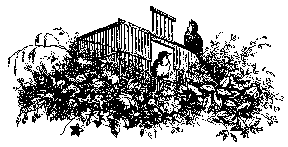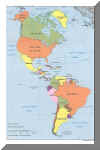
Instead of saying "Kill two birds with one stone", I prefer to say, "Set two birds free from one cage".
 |
Instead of saying "Kill two birds with one stone", I prefer to say, "Set two birds free from one cage". |
![]()
I've seen "Life sucks, and then you die" on some peoples' car bumpers. It's so negative! My reply is "Life's great, and then you go to heaven".
![]()
The only thing I was sure of was when I went off to college was that I wouldn't be a musician (so of course that's eventually what happened). I thought about becoming a doctor. It seemed like a great career--you're helping people, my parents would be proud, I imagined vacationing anywhere in the world and driving a nice car. However, my freshman year I decided chemistry was too complicated and preferred studying mandalas. I also knew by that time that I didn't have the stomach for attending patients--I get queasy when someone describes their pain, it's like a dull ache in my bones when I hear someone describe their condition. Once my grandmother asked me to do her a favor, I didn't know what it was until she rolled up her sleeve and asked me to trim a dried vein that was sticking out. I turned away in horror. I figure you can't be a doctor if you can't listen to people describing their pain, let alone look at an injury. I've almost fainted a couple of times watching friends and family get wounds cleaned or injections. If I was a doctor, all I would be able to do would be to make appointments and then refer them on to a specialist--one of those doctors who listen to patients and come up with some treatment to try. Other signs medicine was not the career for me: I couldn't type my own blood in biology class, I just kept trying to lance my finger tip for the whole period unsuccessfully. There was no way I was going to dissect a frog.
By the time I ended college and graduate school I'd gone in the direction of computer music.
Outside of school I found that music was a difficult career. Being a glamour industry there are lots of people willing to work cheaply in order to break into the business, and many make the logical mistake of seeing stars in the media and thinking they could do as well, and therefore were bound to be successful. The problem is that talent alone is not enough, there are "the breaks", connections, personality, and many other factors that go into it. With media a few super talents can entertain millions, and there just aren't enough musical emergencies to drive up the prices. If your arm has been severed and barely hanging on you will pay everything you have and promise the rest to get it repaired. I don't know of an analogy in the field of music--no composer has yet been awakened from a sleep in the middle of the night by a distraught father begging for a tune to help a sick child--"Please, doc, you gotta help her! She needs some augmented chords...now! You can have my vacation home!"
 My older brother became a doctor. We were all proud of him and it was
so comforting to have him around when my parents were in their final
stages. He could interpret the doctors' communications for us and it
seemed they were more alert when he was in the room. I knew if there was an
emergency at home that he and my sister in law (who is a nurse) would be able
to handle it. We were all there in the house one day when my Mom got to
the end and there was nothing medicine could do to restore her to health.
I played the piano for a while and felt like that was something that I could do
that doctors couldn't, that it took her somewhere. I retrieved some of the
value that I'd lost in my estimation of the arts. They may not save a
life, but they can make it better.
My older brother became a doctor. We were all proud of him and it was
so comforting to have him around when my parents were in their final
stages. He could interpret the doctors' communications for us and it
seemed they were more alert when he was in the room. I knew if there was an
emergency at home that he and my sister in law (who is a nurse) would be able
to handle it. We were all there in the house one day when my Mom got to
the end and there was nothing medicine could do to restore her to health.
I played the piano for a while and felt like that was something that I could do
that doctors couldn't, that it took her somewhere. I retrieved some of the
value that I'd lost in my estimation of the arts. They may not save a
life, but they can make it better.
The more I think about it, though, there may be some cases in which music can save a life. My advice to parents is to learn to sing--there are going to be those moments when the child is inconsolable and remembering or improvising the right song can change the mood. This could just be the thing you're going to need to keep from strangling them!
![]() ...And then there's this challenge to musicians: "Every disease is a
musical problem. It's cure, a musical solution. The more rapid and complete the
solution, the greater the musical talent of the doctor." -- Novalis
...And then there's this challenge to musicians: "Every disease is a
musical problem. It's cure, a musical solution. The more rapid and complete the
solution, the greater the musical talent of the doctor." -- Novalis
![]()
There are many ways to classify people into two groups. The have's and have not's, carnivores and herbivores, etc. Others have appeared to me from my experience:
I played for one wedding where it seemed to be BYOB, the only thing to eat I saw was fried won ton skins with nothing inside them. After about an hour all the guests had drifted off and the bride was going around in her wedding dress cleaning out the ashtrays. The couple honeymooned in Hawaii, and she died. Seemed that they'd known she was sick but were hoping to have some time together. The stress of the wedding seemed to accelerate her illness. The husband came home with a photo album. I resolved to have a nice party were I ever to have a ceremony.
Another thing I learned at parties was how to handle sticky hands. Wanting to take advantage of free food, musicians at parties are sometimes faced with a situation where the second break becomes an all-you-can-eat for 15 minutes. The first break is often inappropriate, as the guests often have not yet helped themselves to the food. If you wait for the last break the food is often being put away or gone. Given the limited time, one learns to eat fast, and depending on the surroundings, to eat fast while not looking too piggish. One thing you do not want to do is waste five minutes looking for a napkin, and as the break approaches you would like some place to wipe your fingers. Some have suggested the insides of pockets, but tuxedos are not laundered frequently enough. My solution is to pretend to pull up your sox, taking quite a bit of time to get them just right, and in the process rid oneself of whatever was on one's hands.
![]()
My friend, Christopher Dobrian, told me he learned two things from having a baby. He didn't know that it is possible:
I think he is right, and my theory is that the two are interconnected. One's ego is cracked by the constant caring and attention that is given a child, who at this stage cannot reciprocate. Getting up or staying up at night to attend hunger, cold, wetness, fear, and illness over a period of years leads to sleep deprivation, weakening one's resistance to another being. Perhaps this is part of mothers' closer attachment to children, as traditionally they have been the more sleepless.
I resisted having children for a long time. It was partly for environmental reasons, but I think deep down I was afraid that I wasn't going to be able to support a family. I told my Dad that I was too selfish, he said that was one of the reasons for having kids, that you'd get over some of that. A number of people hinted that having kids was the greatest thing, but I thought "How do you know?". You can't really do a controlled experiment, pass one lifetime with kids and then one without and compare them to see which one really is better. However, over the years none of the people without kids ever commented that not having kids was the greatest thing (you can have a tidy house, more money in the bank, exotic vacations, etc.), so the evidence began to pile up on the side.
![]() What's the meaning of life? Reduced to its simplest, most obvious form
(i.e. viewed from a biological perspective):
we're here to reproduce.
What's the meaning of life? Reduced to its simplest, most obvious form
(i.e. viewed from a biological perspective):
we're here to reproduce.
![]()
 We
often think of South America as being directly under North America. What
I've noticed is that it has gradually shifted towards the east, or perhaps we in
the north are moving west. In any case, I propose that to reduce our
preconceptions in the new millennium that we do away with old names and begin
saying "West America" for that continent which includes Canada, and
"East America" for the home of Venezuela.
We
often think of South America as being directly under North America. What
I've noticed is that it has gradually shifted towards the east, or perhaps we in
the north are moving west. In any case, I propose that to reduce our
preconceptions in the new millennium that we do away with old names and begin
saying "West America" for that continent which includes Canada, and
"East America" for the home of Venezuela.
![]()
©2001 Robert Willey
[ scrapbook ]